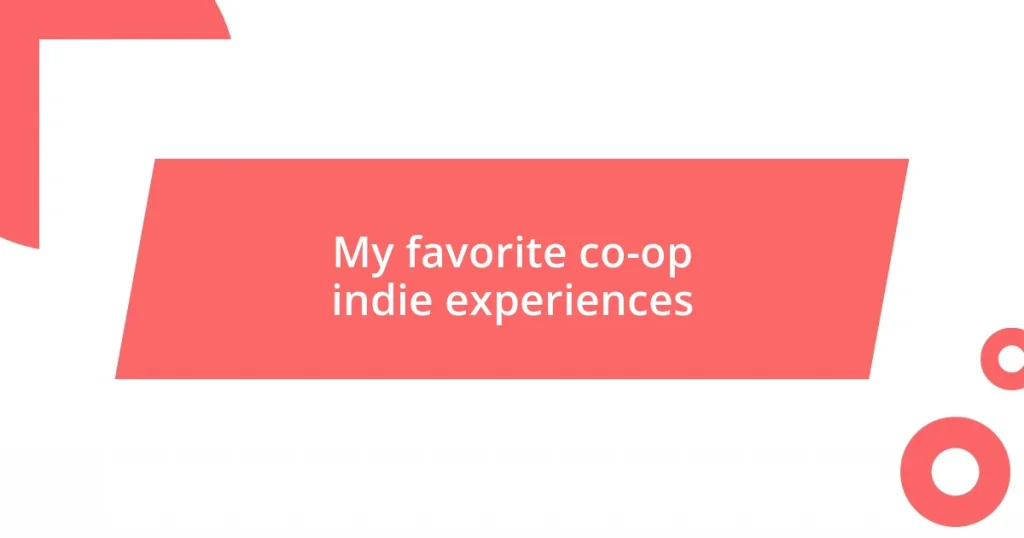Key takeaways:
- Co-op games like *Overcooked!* and *Stardew Valley* create lasting memories through teamwork, communication, and shared achievements.
- Indie games stand out for their artistic innovation and unique narrative experiences, allowing for deep emotional connections and community building.
- Finding friends for co-op gaming can enhance enjoyment; reaching out online or inviting acquaintances can forge stronger bonds through shared gaming experiences.
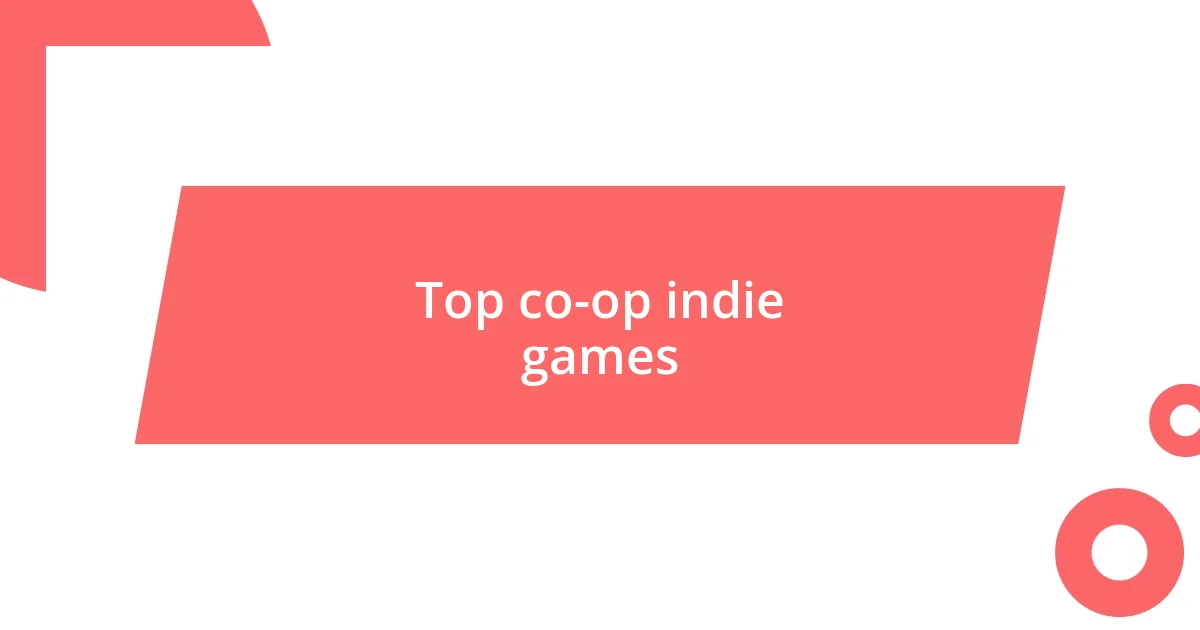
Top co-op indie games
One game that consistently stands out in the co-op indie scene is Overcooked! It’s the perfect blend of chaos and teamwork—like a culinary roller coaster! I still remember my friends and I frantically chopping vegetables and burning dishes while laughing and shouting directions at each other. It’s not just about cooking; it’s about communication and timing, and that’s where the real magic happens.
Stardew Valley offers a lovely contrast, combining farming simulation with co-op gameplay. My partner and I spent countless weekends tending to our virtual crops, and I found joy in those simple moments—whether it was exploring the mines together or participating in seasonal festivals. Have you ever felt that surge of satisfaction when you accomplish a goal together? It’s that sense of shared achievement that makes every pixel count.
If you’re looking for something a bit different, give A Way Out a try. This unique game focuses on two prisoners trying to escape, and the narrative and puzzles really pull players in. I remember playing through it with a friend, and there was a moment when we had to synchronize our actions to evade guards. That thrill of working in tandem was exhilarating! Isn’t it fascinating how games can create not just challenges, but unforgettable memories?

Why co-op experiences matter
Experiencing co-op games fosters a bond that’s hard to replicate in other contexts. I remember teaming up with friends to tackle Cuphead, where every level felt like a mini celebration of our perseverance. As we cheered each other on with every significant win or sympathized through failures, I realized that these shared challenges built camaraderie. Isn’t it incredible how a virtual quest can deepen friendships in such a meaningful way?
Co-op experiences can also break down barriers and promote teamwork. On a rainy afternoon, my siblings and I dove into Portal 2’s co-op mode, and I found myself learning to value communication like never before. We had to meticulously plan our moves, and amidst the laughter and the occasional frustration, we emerged stronger as a unit. Have you ever thought about how much better collaboration feels when it’s paired with playful competition?
Moreover, the joy of working together toward a common objective enriches personal experiences. I vividly recall a late-night session of Minecraft where building an elaborate fortress became a father-son project. Those moments of creativity and laughter resonated beyond the game, creating memories that linger to this day. It’s this unique blend of fun, competition, and connection that highlights why co-op experiences truly matter.
| Co-op Game | Why It Matters |
|---|---|
| Overcooked! | Builds teamwork and communication skills under pressure. |
| Stardew Valley | Encourages shared achievements and bonding through gameplay. |
| A Way Out | Promotes deeper engagement through narrative-driven collaboration. |
| Cuphead | Fosters perseverance and celebration of wins in a group. |
| Portal 2 | Enhances problem-solving skills and strategic thinking when working together. |
| Minecraft | Encourages creativity while strengthening personal relationships. |
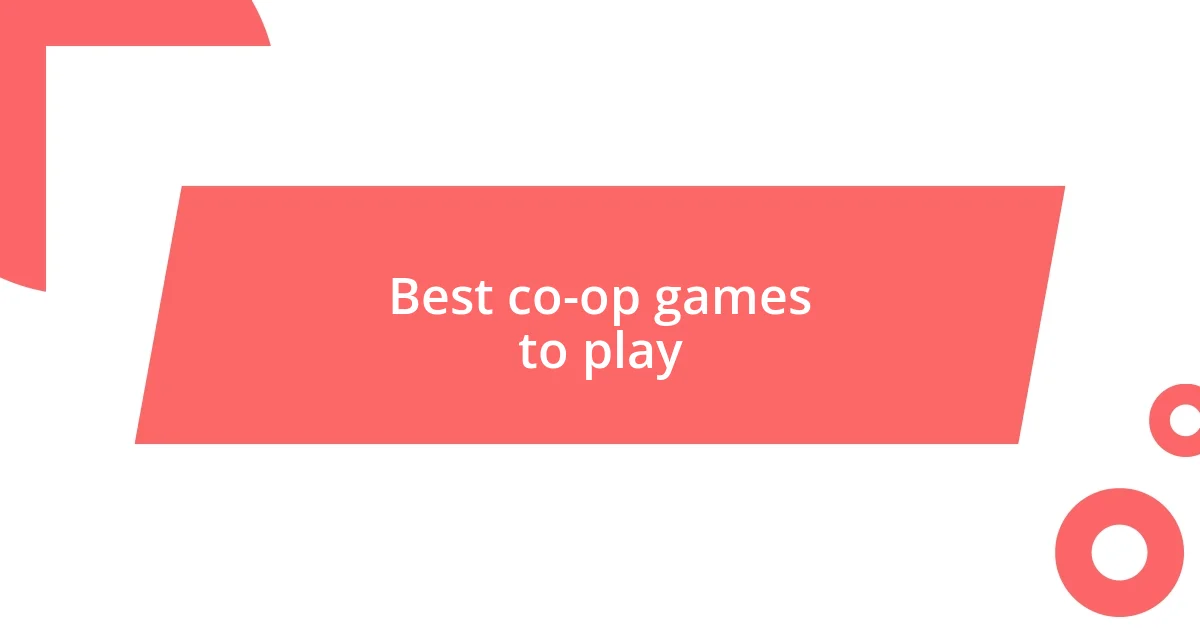
Best co-op games to play
There’s something truly magical about diving into a co-op game with friends. One of my top picks is Human: Fall Flat. The laugh-out-loud moments never cease; I recall a session where my friend and I hilariously struggled to control our wobbly characters while trying to solve gravity-defying puzzles. The quirks of our clumsy avatars made every triumph feel earned—and those shared laughs still bring a smile to my face.
Here’s a quick list of some standout co-op games I’ve had the pleasure of playing, each offering its unique charm:
- Human: Fall Flat – Encourages creativity and laughter through physics-based puzzles.
- It Takes Two – A heartfelt adventure focusing on teamwork to navigate a couple’s journey towards reconciliation.
- Castle Crashers – Combines beat-’em-up action with vibrant art, making it fun to team up and tackle enemies together.
- Lovers in a Dangerous Spacetime – Excitement reigns as you and your partner manage a quirky spaceship, highlighting the essence of collaboration.
- Don’t Starve Together – This survival game has a frantic sense of urgency as players fend off creatures and gather resources, pushing each other to strategize effectively.
Each of these games offers a different flavor of co-op experience, making them perfect for creating unforgettable memories with friends!
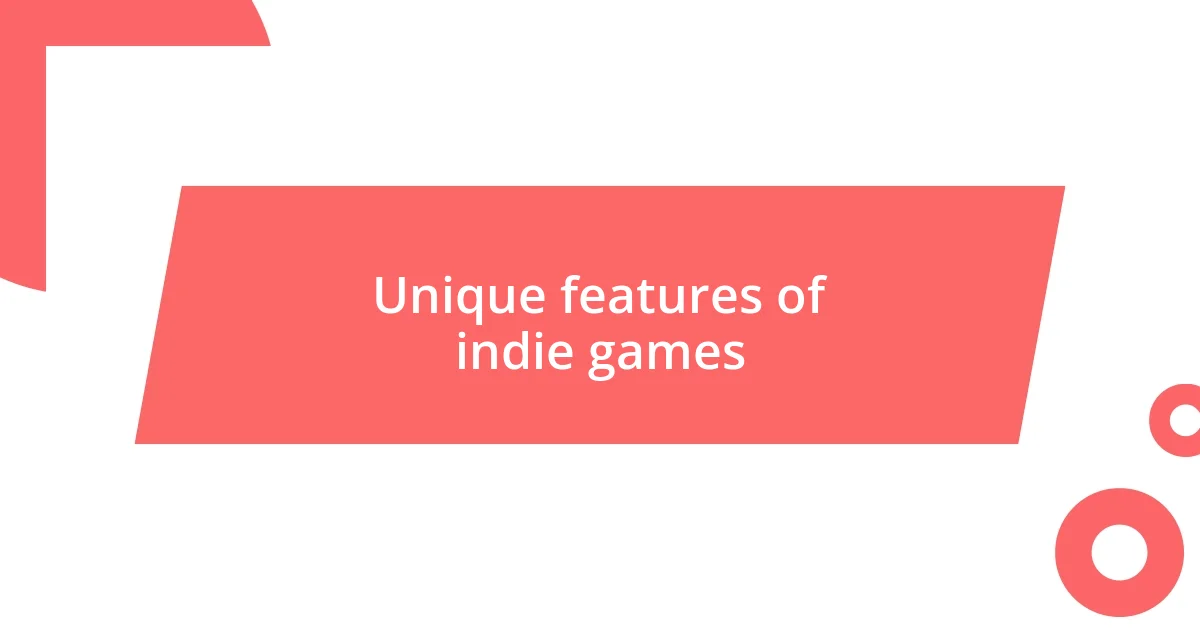
Unique features of indie games
Indie games often showcase artistic innovation and storytelling that you simply don’t find in larger titles. I once immersed myself in Journey, and the way it used visuals and music to evoke deep emotions was nothing short of enchanting. Have you ever felt that a game could communicate feelings more eloquently than words?
Another distinct feature of indie games is the freedom they have to experiment with gameplay mechanics. In Celeste, for example, I discovered a challenging yet rewarding platforming experience intertwined with a poignant narrative about mental health. It was fascinating to see how a game could address such a serious subject while also being incredibly fun to play. This combination of entertainment and meaningful messages truly sets indie games apart.
What makes indie titles even more appealing is the sense of community they foster. I remember attending a local gaming event, where gamers gathered to discuss Hollow Knight, sharing tips and personal stories about their journeys. That sense of belonging, connecting with others over a shared love for these unique experiences, reminded me why I love supporting independent developers. Isn’t it uplifting to think that games can create bonds in the real world, just as they do in the digital one?
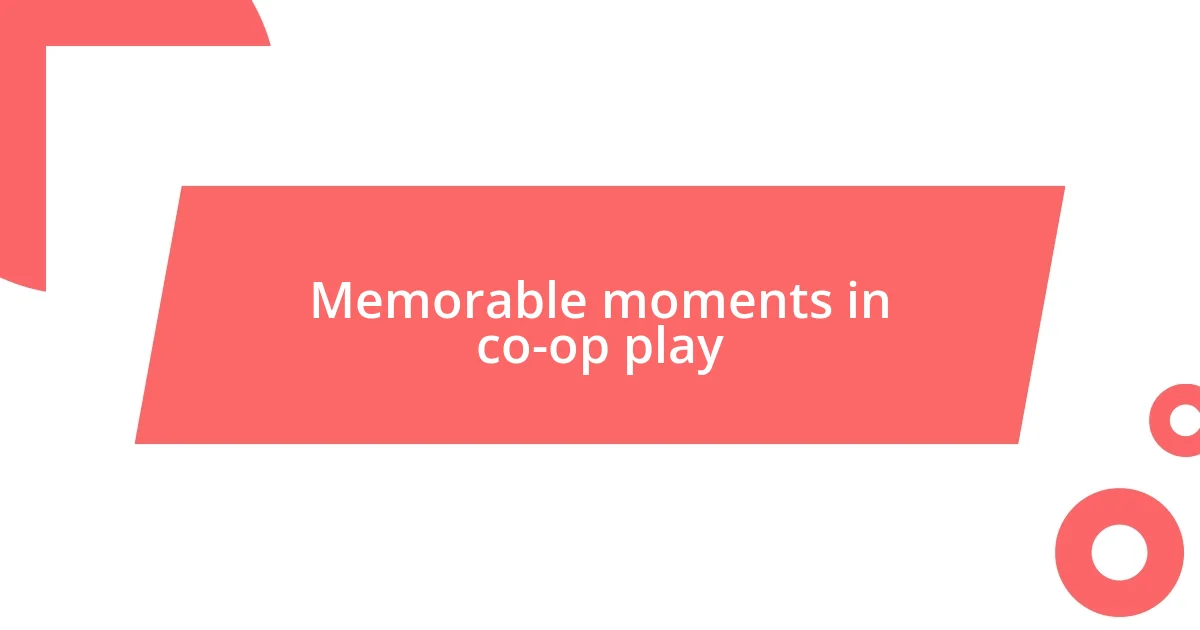
Memorable moments in co-op play
There are moments in co-op play that linger long after the game has ended. I vividly remember a chaotic session of Lovers in a Dangerous Spacetime, where we were scrambling to switch stations on our ship while under attack from alien adversaries. The sheer panic in our voices and the laughter that erupted when we hilariously mismanaged our stations is something I can still hear today.
In another game, It Takes Two, my partner and I experienced a breakthrough during a particularly challenging level. We had been stuck, frustrated and ready to give up, when we suddenly figured out how to synchronize our actions. It wasn’t just a gaming achievement; it felt like a genuine partnership moment. We high-fived, and I realized how powerful teamwork can be—both in games and life.
Then there’s the time we played Don’t Starve Together. It started as a friendly gathering, but soon the tension was palpable as night approached and monsters began to appear. We scrambled to gather resources, bantering back and forth about who forgot to set up the fire. In that instant, the frantic energy and shared goal created a bond that was as thrilling as it was memorable—and we’re still chuckling about who “definitely” forgot the torches. Isn’t it amazing how these little moments forge lasting friendships?
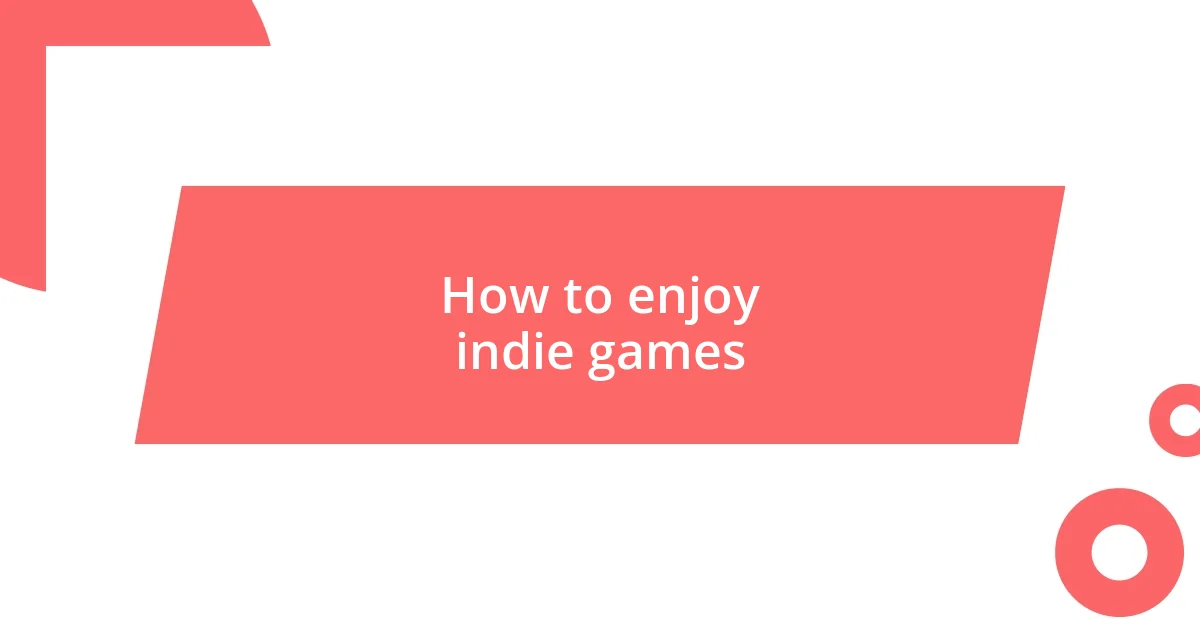
How to enjoy indie games
Embracing the world of indie games can be a transformative experience, and the key is to allow yourself the space to explore. I often find that diving into the narrative of a game can reveal layers that are not immediately apparent. For instance, playing Undertale opened my eyes to choices and consequences in a way I had never experienced before. Have you ever paused to reflect on the impact your decisions can have, both in-game and in real life?
Finding a comfortable environment to play also enhances the experience. I suggest gathering a few friends (virtually or physically) and sharing your thoughts as you play. I got a great kick out of playing Overcooked! with friends, where the blend of chaos and laughter painted an unforgettable evening. The shared experience intensified our enjoyment and made every little victory feel like a joint achievement.
Lastly, don’t hesitate to seek out online discussions or forums. Connecting with like-minded fans can add depth to your understanding of a game. I remember joining a Reddit thread discussing Oxenfree, where fellow players shared their interpretations of the story and its themes. The insights I gained from that conversation reshaped my perspective on the game—what’s your favorite aspect of discussing games with others? I find those conversations can breathe new life into a title you thought you had fully grasped.
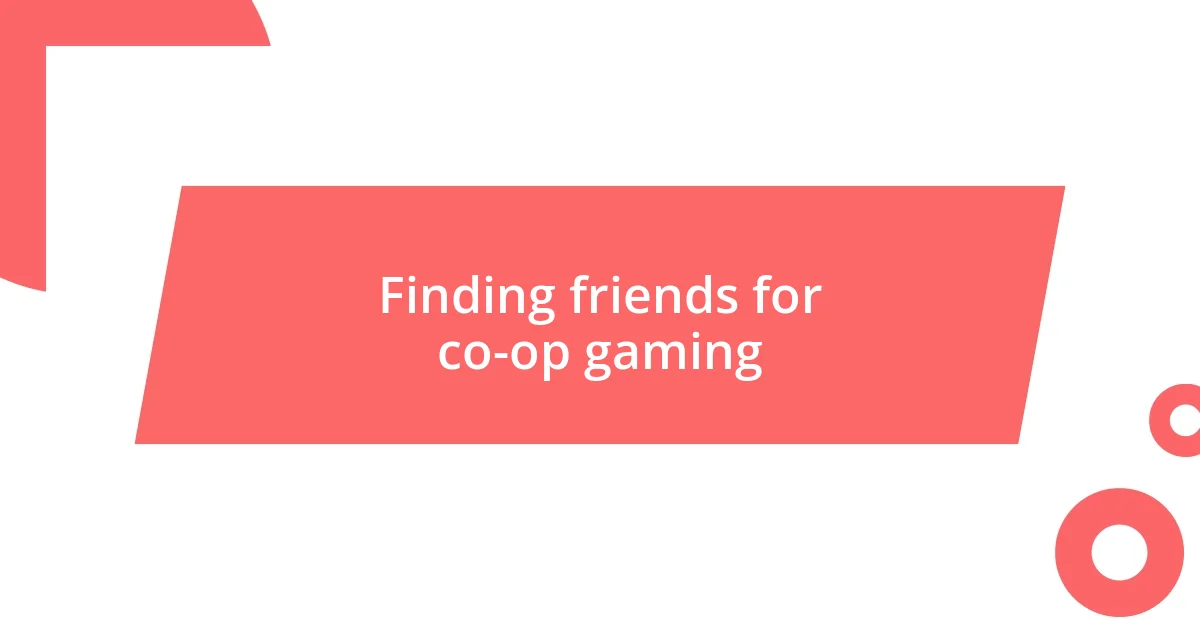
Finding friends for co-op gaming
Finding friends for co-op gaming can sometimes feel like a quest in itself. I remember when I stumbled upon a community online while searching for players for Phasmophobia. Posting in a dedicated forum not only connected me with some fantastic folks but also turned into a regular gaming night filled with laughter and plenty of ghostly scares. Have you ever reached out to a community only to discover a treasure trove of friendships waiting for you?
Another strategy I’ve found effective is simply asking friends. I reached out to a few acquaintances during a casual get-together, suggesting we tackle Deep Rock Galactic together. To my surprise, they were just as eager to dive into the adventure. That shared enthusiasm heightened our enjoyment. It’s fascinating how a small invitation can lead to hours of bonding over shared victories and, yes, sometimes catastrophic failures.
Additionally, embracing platforms like Discord or gaming hubs can be game-changers. I recall joining a Discord channel dedicated to co-op games, where I met a group of players who shared my love for indie adventures. Together, we explored Spiritfarer, sharing emotional stories and fostering connections deeper than mere gameplay. Isn’t it incredible how virtual spaces can help form friendships that transcend just the gaming world?










